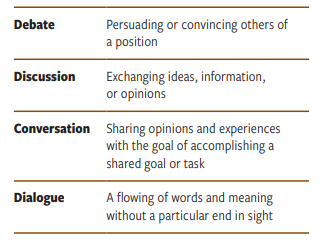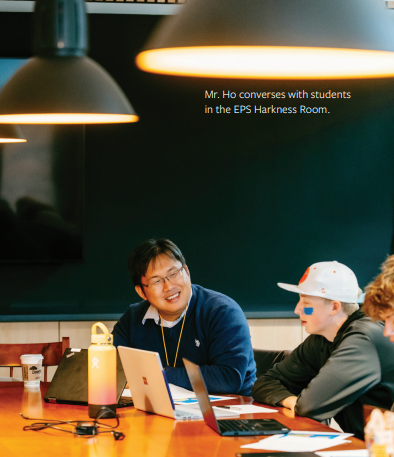
By Cheryl Schenk, Director of Enrollment Management
 In July, four EPS leaders joined more than sixty participants from independent schools around the country to learn more about how dialogue can strengthen our communities. Originating from fellow National Association of Independent Schools (NAIS) member schools, professional development was furthered by the diverse roles and backgrounds of conference attendees. Facilitated by practitioners from the Global Education Benchmark Group (GEBG), we had opportunities to practice dialogue skills and workshop our project ideas together. The GEBG faculty have all served in different independent school settings and bring perspectives and understanding from those school communities. Together at the NAIS headquarters in Washington, D.C., we engaged in learning together for the benefit of both our schools and our world!
In July, four EPS leaders joined more than sixty participants from independent schools around the country to learn more about how dialogue can strengthen our communities. Originating from fellow National Association of Independent Schools (NAIS) member schools, professional development was furthered by the diverse roles and backgrounds of conference attendees. Facilitated by practitioners from the Global Education Benchmark Group (GEBG), we had opportunities to practice dialogue skills and workshop our project ideas together. The GEBG faculty have all served in different independent school settings and bring perspectives and understanding from those school communities. Together at the NAIS headquarters in Washington, D.C., we engaged in learning together for the benefit of both our schools and our world!
As members of our Equity, Inclusion, and Compassionate Leadership (EICL) Steering Group at EPS, the four of us were able to consider the power of dialogue across the Eastside Prep experience.
Highlighting opportunities for empathetic dialogue within our school community, it’s helpful to define dialogue as a unique form of exchange:
What is dialogue? It’s one of four different forms of discourse. You may be more familiar with other forms of discourse or use them more often, such as “debate” or “conversation.”
Why is Dialogue Important at EPS?
At Eastside Prep, we often talk about curiosity and kindness as key characteristics of our students, as well as our approach to learning through relationship and inquiry. Dialogue is curiosity and kindness in action through discourse. It focuses on empathetically considering the perspectives of others within the framework of a curious, guiding question. Because there is not a specific goal for the conversation beyond perspective-sharing and listening, dialogue helps us to discover more about our community.
Where is Dialogue Already Happening at EPS?
We already have dialogue happening in many parts of our community, both in and beyond the classroom.
Harkness Discussions / Tela Discussions
Teachers step back in these discussions to center student voices and share the conversational leadership. While they are often based on a guiding question that comes from the text being discussed and might have a specific outcome in mind, they emphasize conversational norms that align with dialogue.
Seminar Program
Six to eight is an ideal number for participants sharing dialogue— and it’s exactly the size of our optional, six-week Seminar classes in tenth through twelfth grades. Because Seminar topics are often exploratory in nature, dialogue can provide an excellent tool for discourse in which content expertise is not required.
Education Beyond the Classroom
Challenging topics can arise due to the unique nature of EBC as a form of experiential education, and these provide ideal spaces for dialogue as students reflect upon and share out their learning takeaways. Many EBC leaders and chaperones will engage in debrief conversations following an activity; debrief following dialogue is an essential part of harnessing its effectiveness through making thinking visible.
Affinity Groups
Affinity spaces, in which group members identify with the group from an “I” perspective, often use dialogue as the main form of discourse. Members are sharing from their own perspectives and listening empathetically to others, often with no specific goal beyond giving their personal insights and hearing others.
Parent Care Groups
Offered as a resource to all EPS parents and guardians, Accompanied for Caregivers (formerly called Parent Care) centers how we can best support our students by first supporting ourselves. Drawing from their experiences of family life, participants and group facilitators do not need to be adolescent development experts to benefit from the guiding questions and topics provided by Dr. Kelly Moore. The aim of Accompanied for Caregivers is creating connection.
Why Does Dialogue Matter Now More than Ever?
Living our EPS mission, students must understand the perspectives of others to be compassionate leaders. With polarization increasing across American society due to factors including social media, the perspective-taking nature of dialogue helps us to listen and understand one another. Inspiring students to create a better world requires us to support students in seeing its interconnectedness, not simply its divisions.
What Kinds of Dialogue Can we Expect to See in the Future at EPS?
In addition to sustaining our existing programs in which dialogues are facilitated, this form of discourse can uniquely support our students’ learning during the coming months, particularly as international conflicts continue, and as we approach the 2024 presidential election. From advisory sessions to co-curricular clubs as well as classroom settings, dialogue can be a tool to increase interconnectedness in the EPS community, and we hope, the world beyond.


